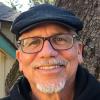
Rev. Martin Luther King Jr. speaks at a rally against the Vietnam War in St. Paul, Minnesota, April 27, 1967. (Wikimedia Commons/Minnesota Historical Society)
Though not a Catholic, the Rev. Dr. Martin Luther King Jr. deserves to have his legacy of non-violence, love and justice recalled in the context of Catholic social teaching. What's more, the movement he led was very much aligned to Catholic thought.
After all, as remarkable as King's gifts were as preacher, leader and organizer, it should not be forgotten that he was but part of a movement. The "movement" was made up of people: maids, children, sharecroppers, college students, preachers, union leaders, teachers and thousands of other courageous people who prayed, cried, marched, tried to vote, risked their jobs, risked mob violence and fought for justice and human dignity.
The movement was Fannie Lou Hamer, Septima Clark, Rev. John Lewis, Andrew Young, Diane Nash, Ella Baker, Bayard Rustin, the Rev. James Lawson, the Rev. Fred Shuttlesworth, Stanley Levinson, Marian Wright Edelman, Viola Luizzo, the Rev. James Reeb, Harry and Harriet Moore, Myrlie and Medgar Evers, and thousands of others. Many were murdered in bombings, shootings or beatings with bats and chains.
Advertisement
The movement, including but not limited to King, was the embodiment of Catholic social teaching promulgated by Pope John Paul II. In his encyclical letter, Sollicitudo Rei Socialis ("On Social Concern"), the pontiff highlighted the principle of solidarity.
He wrote:
[Solidarity] is a firm and persevering determination to commit oneself to the common good; that is to say, the good of all and of each individual, because we all are really responsible for all. … Positive signs in the contemporary world for the growing awareness of solidarity among the poor themselves, their efforts to support one another, and their public demonstrations on the social scene, which, without recourse to violence, present their own needs and rights.
The pope concludes this section by noting, "Solidarity is undoubtedly a Christian virtue. … In light of faith, solidarity seeks to go beyond itself, to take on the specifically Christian dimension of total gratuity, forgiveness and reconciliation."
The civil rights movement was a vibrant and grace-filled expression of Christian virtue as described by John Paul II. While not "big C" Catholic, King and his compatriots lived out the value of solidarity through prayer meetings, songs, marches, retreats, discussions, debates, speeches and courage in the face of violence and grave injustice.
While not "big C" Catholic, King and his compatriots lived out the value of solidarity through prayer meetings, songs, marches, retreats, discussions, debates, speeches and courage in the face of violence and grave injustice.
King's activism extended beyond the interests of Black Americans as he identified the intersectionality between racial injustice, war and economic inequality. To that end, he and the Southern Christian Leadership Conference began intense planning of the Poor People's Campaign. Their effort is described in detail in the book, Dr. Martin Luther King and the Poor People's Campaign of 1968 by Robert Hamilton.
King and others believed a coalition of the excluded — African Americans, Indigenous, poor whites, Hispanics, welfare recipients, displaced factory workers and others — could persuade the nation to radically change its priorities from war and inequality to peace and social welfare. To that end, King and others traveled the nation to recruit impoverished people of all races to come to Washington, D.C., to advocate, protest and, if necessary, peacefully shut down the government until people's needs were prioritized over war and profit.
Hamilton's book details how King and movement leaders from the Southern Christian Leadership Conference connected with Appalachian whites, welfare rights organizations, Chicanos in the southwest, Indigenous peoples, Blacks in urban and rural areas, and many others. It is incredible that a multi-racial movement for economic justice in the United States has been largely erased from history. Of course, J. Edgar Hoover, after whom the FBI building in the nation's capital is named, ordered all FBI field offices to implement "Operation Pocam," aimed to "destroy the Poor People's Campaign." The campaign was scheduled to begin in May 1968. King was murdered that April.

People walk by the Martin Luther King, Jr. Memorial, ahead of the presidential inauguration of U.S. President-elect Donald Trump, in Washington, U.S., Jan. 16, 2025. (Reuters/Marko Djurica)
King and the Southern Christian Leadership Conference, and all those involved in the Poor People's Campaign, were living examples of Gaudium et Spes, ("The Church in the Modern World"), which opens: "The joys and hopes, the griefs and anxieties of the men of this age, especially those who are poor or in any way afflicted, these too are the joys and hopes, the griefs and anxieties of the followers of Christ. Indeed, nothing genuinely human fails to raise an echo in their hearts."
King and the organizers of the Poor People's Campaign felt the grief of America's poor, regardless of race, language or region. Hamilton notes in his book that King often cried listening to the pains of the poor in Newark, Appalachia and Mississippi. Their humanity and hurt echoed deeply in his heart.
Some of the issues of King's time are still with us, and new challenges arise daily. The threatened deportation of millions, tax cuts for billionaires, erosion of the social safety net, denial of medical facts, climate science and historical truths, destruction of federal environmental regulations, undermining public employment and unions, condoning racist language and behaviors are all among the features of our incoming federal administration.
Our work and calling is clear. Martin Luther King, the civil rights movement, the Poor People's Campaign and the clarity of Catholic social teaching are beacons of light for us to follow in these upcoming times. The urgent question: Is love, engaged in the work for justice, more powerful than bitterness, resentment, fear, intolerance and injustice? It's time we found out.





